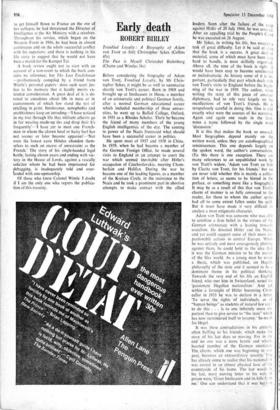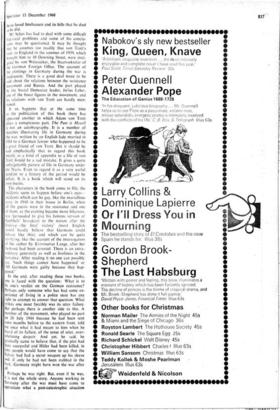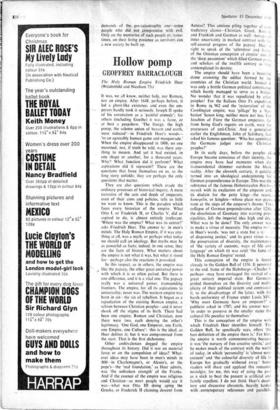Troubled Loyalty: A Biography of Adam von Trod zu Selz
Christopher Sykes (Collins
Early death
ROBERT BIRLEY
45s) .
The Past is Myself Christabel Bielenberg (Chatto and Windus 36s) Before considering the biography of Adam von Trott, Troubled Loyalty, by Mr Chris- topher Sykes, it might be as well to summarise shortly von Trott's career. Born in 1909 and brought up at Imshausen in Hesse, a member of an aristocratic and political German family, after a normal German educational career which included membership of three univer- sities, he went up to Balliol College, Oxford, in 1931 as a Rhodes Scholar. Thee he 'became the friend of many members of the young English intelligentsia of the day. The coming - to power of the Nazis 'frustrated what should have been a successful career in politics.
He spent most of 1937 and 1938 in China. In 1939, when he had become a member of the German Foreign Office, he made several visits to England in an attempt to avert the war which seemed inevitable after Hitler's occupation of Czechoslovakia, meeting Cham- berlain and Halifax. During the war he became one of the leading figures, as a member of the Kreisau Circle, in the resistance to the Nazis and he took a prominent part in abortive attempts to make contact with the allied leaders. Soon after the -failure of the coup against Hitler of 20 July 1944, he was arresled. After an appalling trial by the People's Court be was executed on.26 August. Mr Sykes, in writing his life, has essayed a task of great difficulty. Let it be said at , that the book is a success. A great deal oi material, some of which must have been sc-y hard to handle, is most skilfully organ: Above all, the tone of. the book is right. it would have been easy to become sentimental or melodramatic. As history some of it is im. portant, particularly that part which deals with - von Trott's visits to England before the begin. fling of the war in 1939. The author, when writing the story of this piece of amateur diplomacy, had to rely very' largely on the recollections of von Trott's friends. He is scrupulously careful in doing this. One is told exactly what were the sources of his narrative. Again and again one reads in the foot- notes a name followed by the single word 'discussion.' _ It is this that makes the book so unusual. Most biographies, depend mainly on the written word, unless they are autobiographical reminiscences. This one depends largely on the spoken word, the author's conversations. (To this there is one exception. There are many references to an unpublished work by von Trott's widow, 'Adam von Trott zu Solz by Clarita von Trott, for his friends,' but we are never told whether this is mainly a collec- tion of letters, as seems to be hinted in the preface, or something more like a biographY) It may be as a result of this that von Trott's charm of manner is so fully conveyed to the reader, for those to whom the author spoke had all to some extent fallen under his spell. But it must have made it -very difficult ti analyse a most enigmatic, character.
Adam von Trott was someone who was ab!e to combine a firm belief- in the virtues of the German aristocracy with a leaning towards socialism. He detested Hitler and the Nazis, and yet could support some of their most un- pardonable actions in central Europe. When he was actively and most courageously plotting against them, he could hold to the idea that it was the German mission to be the master of the Slav world. As a young man he wrote a thesis, which was published, on Hegel's philosophy of the state and it seemed to be a dominant theme in his -political thinking. Towards the very end of his life an English friehd, who .met him in Switzerland,- noted `passionate Hegeffin nationalism.' And *Rhin a fortnight of Hitler becoming Chan- cellor in 1933 he was to declare in a letter, `To " Serve the right's • of individuals, or of "human beings" as students of natural law say : to do this . . . is to one infinitely more im- portant than to give service to "the state" which has now surrendered itself to tyranny.' So much for Hegel.
It. was these contradictions in his attitude, often baffling to his 'friends, which make the story of his last days so .inoving. For in the end no one was a more heroic and whole- , hearted member of the German resistance. The_Charin, which one was beginning to sus- pect, becomes an extraordinary serenityA. )1.e has already thine to realise that his national' !n was rooted in an almost physical love :of.lhe countryside of his home. The last words in his last, most moving letter to his wife ,n prise!' were, 'Greet Ithshausen and its hills frc 711 me.' One can understand that it was be6.
p he so loved Imshausen and its hills that he died as he did.
Mr Sykes has had to deal with some difficult historical problems and some of his conclu- sions may be questioned. It may be thought that he assumes too readily that von Trott's visits to England in the summer of 1939, which
brought him to 10 Downing Street, were insti- gated by von Weizsacker, the Staatssekretiir of the German Foreign Office. The account of
the plottings in Germany during the war is inadequate. There is a good deal more to be said about the relations between the resistance movement and Russia. And the part played by the Social Democrat leader, Julius Leber, one of the finest figures in the movement, and his relations with von Trott are hardly men- tioned.
It so happens that at the same time as the publication of this book there has
appeared another in which Adam von Trott plays a conspicuous part. The Past is Myself is not an autobiography. It is a number of sketches illustrating life in Germany during the war, written by an English lady married in 1934 to a German lawyer who happened to be a great friend of von Trott. But it should be ,aid emphatically that to regard this book merely, as a kind of appendix, to a life of von Trottfirould be a sad mistake. It gives a quite unforgettable picture of life in Germany under The Nazis. Even to regard it as a very useful pendant to a. history of the period would be unfair. It is a book which will stand on its own merits.'
The characters in the book come to life; the incidents seem to happen before one's eyes— incidents which can be gay, like the marvellous party 'in 1940 in their house in Berlin, when all the guests were in the resistance and one of them, as the evening became more hilarious, was 'persuaded to give his famous version of Goebbels' broadcast to the nation after the Endsieg--the final victory' (most English I■ould hardly believe that Germans could behave like this); and which can be quite terrifying, like the account of the interrogation of the author by Kriminalrat Lange, after her huiband had been 'arrested. There is an extra- ordinary generosity as well as liveliness in the narrative. After reading it no one can possibly Say, 'Such things cannot have happened' or All Germans were guilty because they hap- pened.'
In the end, after reading these two hooks, one is faced with the question: What is to Be one's verdict on the German resistance? Perhaps only someone who has had some ex- perience of living in a police state has any right to attempt to answer that question. What strikes one most forcibly was its utter failure. But perhaps there is another side to this. A member of the movement, who played no part on 20 July 1944 because he had been sent some months before to the eastern front, told me once what it had meant to him when he heard of its failure, of the sense of utter, over- whelming despair. And yet, he said, he gradually Came to believe that, if the plot had been successful and Hitler had been killed, in time people would have come to say that the Fiihrer had had a secret weapon up his sleeve and, if only he had not been stabbed in the back. Germany might have won the war after • all.
Perhaps he was right. But, even if he was, It is not the whole story. Anyone working in Germany after the war must have come to appreciate what a post-catastrophic situation demands of the pre-catastrophic one—some People who did not compromise with evil. Only on the memories of such people or, some- times, on their living Presence as survivors can a new society be built up.
















































 Previous page
Previous page